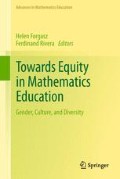Abstract
Findings from international educational studies such as TIMSS or PISA show that gender differences in mathematical achievements are now only marginal, or have completely vanished in many countries. Nevertheless, beliefs about the higher achievements in mathematics by boys are still widespread. In this chapter the results of a study of students’ views of gender-role stereotyping in mathematics are presented. For this study, 1244 German students from lower and upper secondary level (11–17 year olds) were tested using instruments developed by Forgasz and Leder concerned with gendered views of mathematics and mathematics education. The study clearly shows that as they grow up, boys as well as girls in contemporary Germany still have doubts concerning the equal mathematical performances of girls and boys, and internalise gendered stereotypes of girls being less talented and interested in mathematics, influenced by gender-role stereotypes within society, where mathematics is still described as a male domain.
Access this chapter
Tax calculation will be finalised at checkout
Purchases are for personal use only
References
Autorengruppe Bildungsberichterstattung (2010). Bildung in Deutschland – Ein indikatorengestützter Bericht mit einer Analyse zu Perspektiven des Bildungswesens im demografischen Wandel. Bielefeld: Bertelsmann Verlag.
Brandell, G., & Staberg, E-M. (2008). Mathematics: A female, male or gender-neutral domain? A study of attitudes among students at secondary level. Gender and Education, 20(5), 495–509.
Brandell, G., Leder, G., & Nyström, P. (2007). Gender and mathematics: Recent development from a Swedish perspective. ZDM—The International Journal on Mathematics Education, 39(3), 235–250.
Else-Quest, N., Hyde, J. S., & Linn, M. C. (2010). Cross-national patterns of gender differences in mathematics: A meta-analysis. Psychological Bulletin, 136(1), 103–127.
Eurydice (2010). Gender differences in educational outcomes: Study on the measures taken and the current situation in Europe. Bruxelles: EACEA P9 Eurydice.
Fennema, E. (1974). Mathematics learning and the sexes: A review. Journal for Research in Mathematics Education, 5, 126–139.
Fennema, E., & Sherman, J. (1976). Fennema–Sherman mathematics attitude scales. JSAS: Catalog of selected documents in psychology, 6(1):31 (Ms. No. 1225).
Forgasz, H., Leder, G., & Gardner, P. (1999). The Fennema–Sherman mathematics as a male domain scale reexamined. Journal of Research in Mathematics Education, 30(3), 342–348.
Forgasz, H., & Mittelberg, D. (2008). Israeli Jewish and Arab students’ gendering of mathematics. ZDM—The International Journal on Mathematics Education, 40(4), 545–558.
Hoffstall, M., & Orschulik, A. B. (2009). Geschlechterrollenstereotype in der Wahrnehmung der Mathematik. Unpublished masters thesis, University of Hamburg, Hamburg.
Hyde, J. S., Lindberg, S. M., Linn, M. C., Ellis, A. B., & William, C. (2008). Gender similarities characterize math performance. Science, 321, 494–495.
Leder, G., & Forgasz, H. (2002). Two new instruments to probe attitudes about gender and mathematics. ERIC, Resources in Education (RIE). [ERIC document number: ED463312]
Leder, G., Forgasz, H., & Solar, C. (1996). Research and intervention programs in mathematics education: A gendered issue. In A. Bishop, K. Clements, C. Keitel, J. Kilpatrick, & C. Laborde (Eds.), Handbook of research in mathematics education (pp. 597–622). New York: Macmillan.
OECD (2009). Equally prepared for life? How 15-year-old boys and girls perform in school. Paris: OECD.
Tiedemann, J. (2000). Parents’ gender stereotypes and teachers’ beliefs as predictors of children’s concept of their mathematical ability in elementary school. Journal of Educational Psychology, 92, 308–315.
Tiedemann, J. (2002). Teachers’ gender stereotypes as determinants of teacher perceptions in elementary school mathematics. Educational Studies in Mathematics, 50, 49–62.
WZBrief Bildung (2010). Lehrerinnen trifft keine Schuld an der Schulkrise der Jungen. Berlin: Wissenschaftszentrum Berlin für Sozialforschung.
Author information
Authors and Affiliations
Corresponding author
Editor information
Editors and Affiliations
Appendix
Appendix


Rights and permissions
Copyright information
© 2012 Springer-Verlag Berlin Heidelberg
About this chapter
Cite this chapter
Kaiser, G., Hoffstall, M., Orschulik, A.B. (2012). Gender Role Stereotypes in the Perception of Mathematics: An Empirical Study with Secondary Students in Germany. In: Forgasz, H., Rivera, F. (eds) Towards Equity in Mathematics Education. Advances in Mathematics Education. Springer, Berlin, Heidelberg. https://doi.org/10.1007/978-3-642-27702-3_11
Download citation
DOI: https://doi.org/10.1007/978-3-642-27702-3_11
Publisher Name: Springer, Berlin, Heidelberg
Print ISBN: 978-3-642-27701-6
Online ISBN: 978-3-642-27702-3
eBook Packages: Humanities, Social Sciences and LawEducation (R0)

